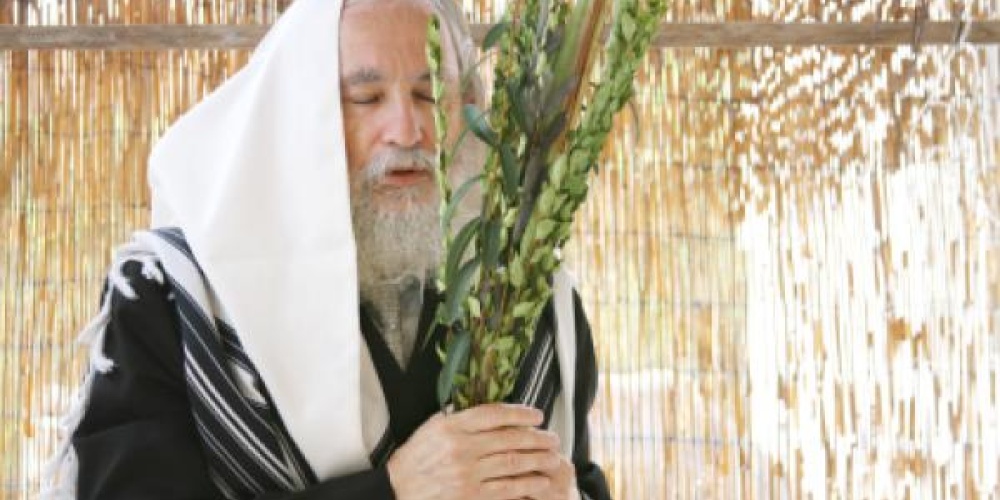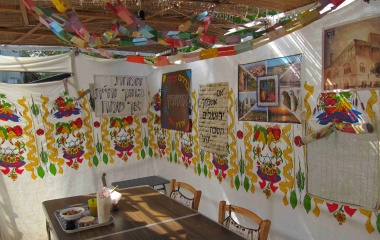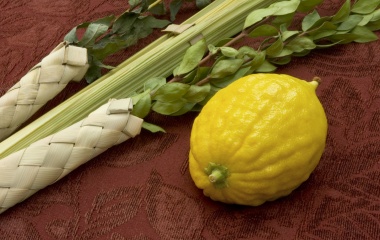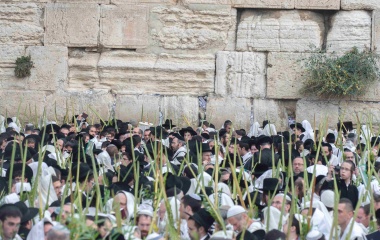
It is these opposite themes that the Rashbam (Vayikra 23:43) claims is the reason these two mitzvoth are linked. Specifically at the time when one is celebrating his material bounty and is susceptible to minimizing G-d's role in one's success claiming that "my strength and might of my hands made me all this wealth" (Devarim 8:17), we are told to leave our protective homes to help us better recognize that our protection comes from G-d[1].
While we take the lulav for just one day we are to sit in the sukkah for all seven days. We only need one day to wave our bounty but we need seven days to drive home the message of our dependence on G-d.
The rabbis had an additional reading of this text. The lulav is the expression of our joy and if we are to rejoice for seven days we must take the lulav for seven days. Yet the Torah says we are to take the lulav on the first day only. Our Sages understood that the "taking on the first day" and the "rejoicing before the Lord your G-d for seven days" were thus referring to two distinct aspects of the mitzvah. When we are before the Lord, i.e. in the Beit HaMikdash we are to rejoice for seven days. Being in, and more importantly feeling the presence of G-d is the ultimate definition of joy, a joy expressed with waving the bounty that G-d has bestowed upon us. We need not fear that in the Temple itself one will forget the Divine source of one's blessings and we can rejoice with the lulav for all seven days[2].
Only at this point does the Torah tell us "you shall dwell in sukkot for seven days". In the presence of G-d the sukkah and the lulav merge into one. We can better understand that G-d is the source of our blessings and our Protector.
This merging of lulav and etrog finds expression in the halachic view of Rav Yehuda that in order for s'chach to be kosher it must be from four species of the "lulav" (Sukkah 36b). This rather extraordinary view, one which is not accepted in practice, sees the sukkah and lulav as flip sides of the same coin and we can't properly observe one without the other[3].
Interestingly there are those who see the sukkah as representing not our frailty but our great power made possible by G-d's protection. The sukkah does not commemorate our flimsy huts in the desert, but rather the clouds of glory of G-d. As to the views that the lulav is to remind us of our weakness please stay tuned for our next installment of the Daily Daf.
_______________________________________________________
[1] See here where I discuss this topic from a different angle.
[2] After the destruction of the Temple Rav Yochanan ben Zackai ordained that Jews everywhere are to take the lulav for seven days, "to remember the Temple". Rav Yochanan ben Zakai wanted us recall and yearn for the joy of the Temple days. With the Jews in exile (he could not imagine the luxury that so many Jews in exile enjoy) and subjugated to the whims of the nations he was not afraid that Jews would come to forget about G-d as they celebrated.
[3] Perhaps this is the explanation of the custom that some have to bench lulav specifically in the sukkah.
Photo: Stockphoto.com/Tova Teitelbaum



